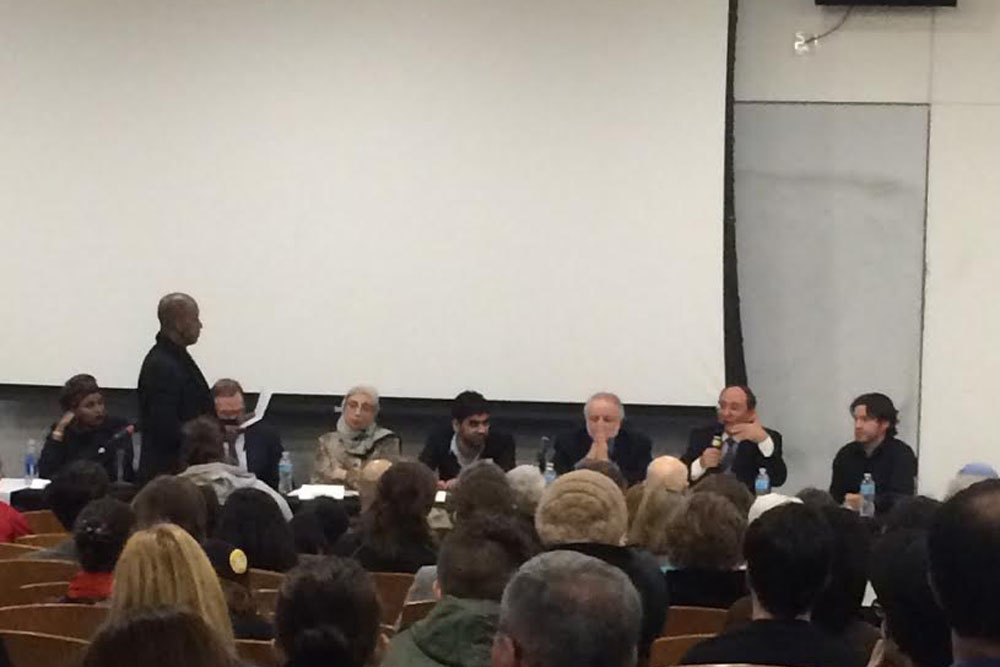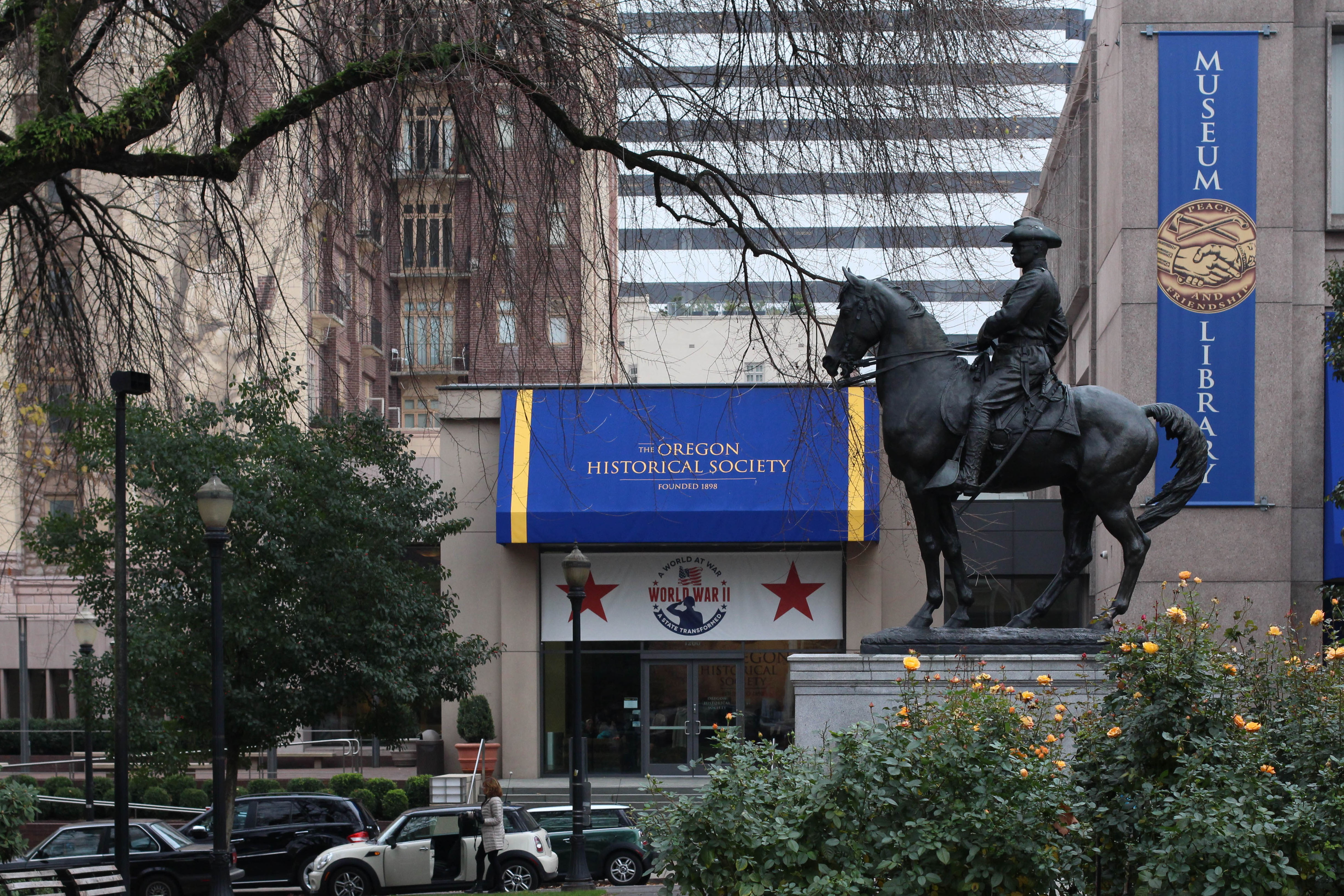An Islamophobia teach-in, held the evening of Feb. 25 in the Academic and Student Recreation Center, was intended to address the consequences of Islamophobia and xenophobia at Portland State.
The event was part of a Cultural Competency training series hosted by PSU’s Office of Global Diversity and Inclusion.
Seven panelists, each with varying experiences with or broad knowledge of Islamophobic and xenophobic issues, discussed topics and responded to questions.
Panelist Baher Butti, founder of Iraqi Society of Oregon, suggested that individuals who want to help in ending Islamophobia and xenophobia change their mindset when considering these issues.
“We need you not to care for us, but to care with us,” Butti said. “We are equal.”
A description for the event from the Cultural Competency training series website included a list of questions the panelists were expected to address, though not all of these were answered directly.
Planned topics included the consequences and damages fear, bias and hate; plans for action; societal effects of fear and hate; the roles of government; school environments for children; the role of the media and consequences of targeted policies and laws.
International Student Mentor for PSU’s Office of International Affairs and Ph.D student Bashar Al-Daomi also sat on the panel. Al-Daomi is originally from Iraq and has been in United States for two years pursuing his P.h.D. in Civil and Environmental Engineering at PSU.
In response to the question, “What happens in society as a result of fear and hate?”, Al-Daomi said people living in Iraq see the effects of Islamophobia in America, and that terrorists use this as propaganda to recruit more people.
Additionally, Al-Daomi noted that Islamophobia angers many Muslim people, which is counterintuitive for Islamophobic people seeing how this anger is then targeted towards the western world.
Associated Students of PSU President Dana Ghazi, who sat in audience, addressed the backlash of Islamophobia.
“Islamophobia is harmful because it legitimizes war in the Middle East…it creates isolation in our communities,” Ghazi said. “When you have isolated communities—people who are not feeling connected to their communities—this is how radicalization is created. When we aren’t together it makes it easier to isolate us, to make us afraid of each other, but when we are together we can create movements [that challenge oppression].”
The panelists shared personal experience with Islamophobia and xenophobia. Students and community members responded with stories of their own, including a personal account shared by a current PSU student originally from Libya.
“Something I want to address, not just [about] the students, but maybe [about] our instructors in class and the way they ask questions,” the student said.
“I come from Benghazi, Libya,” she continued. “We’ve been battling terrorism for four years now. I’ve lived three years of my life in a constant war. We Muslims are the first people who stood against ISIS,” she continued. “People here in America [were victims to] one attack here. We get them on a daily basis back home.”
She continued by noting problems she has observed from university educators who do not demonstrate cultural awareness: “I don’t expect students who are freshmen, or sophomores, to learn how to do this stuff. But for professors who’ve been teaching for 10 or 20 years, to still behave this way…We [have to] stop it.”
PSU student Noel Henry shared a story about her son who received death threats at school because he is Muslim.
“On January 7, my middle school son was beat[en] in school,” Henry said. “Two days later the same thing happened in the same class. And it has escalated to [the extent] that Monday we received our first death threat.”
I think there is a real problem here,” Henry continued. “The students in middle school, and high school, and here at PSU, do not know that the things that they are saying are Islamophobic. I would like to know what people are doing about it in a real and concrete way to try to take this on so that people can actually change the way they’re thinking.”
The public comment continued without Henry hearing direct response to her question from panelists.
Margaret Everett, Vice Provost for International Affairs and Dean of Graduate Studies co-hosted the event. Everett gave examples of PSU administration’s plans to address Islamophobia on campus.
“I’ve been working very closely with our Intensive English Language Program,” Everett said. “Really I think a faculty that is very culturally aware, committed to diversity, committed to a classroom environment that is more supportive of students. So that’s one example.”
“I think a lot of our academic programs—sociology; women, gender and sexuality studies; the College of Urban and Public Affairs—we have faculty all across campus who have researched teaching and [have] a personal interest in these issues,” Everett continued.
Everett was asked to respond to a student who spoke about professors who have asked him to explain ISIS, terrorism, and Muslim affairs, which suggests there may still be professors who don’t have the cultural competency needed to address this issue.
“Yeah, and I think there is work to be done. I think that goes back to the ongoing cultural competency training of the staff and administrators.”
Ghazi explained that a cultural competency module for PSU faculty and staff has already been proposed to the administration.
“The faculty is aware of it, but it’s not applied because the administration didn’t institutionalize it; it’s up to us,” Ghazi said. “I am a mentor in University Studies [where] we talk about these issues in our class; we talk about racism, we talk about Islamophobia, but it’s so surprising—we go to classes and then our faculty is saying stuff that is oppressive, and we have to interrupt them because we have to lead that.”
According to Ghazi, there was confusion as to who would be on the panel for the event. Ghazi, a Syrian Muslim, was asked to be on the panel. However, a day after Ghazi accepted the position, she was informed that the spot had been already filled.
Those who attended the teach-in learned that in fact, the position has not been filled.
Two students who had been selected to speak on the panel pointed out that they had only been contacted to be a part of the panel 45 minutes before the event was scheduled to take place.
In response, Ghazi said, “I want to tell you that your student government wasn’t invited to this event.”
Ghazi further explained that ASPSUhad initially contacted the Board of Trustees about the issue of Islamophobia on campus, further highlighting the confusion that the person who had proposed such discussion had not been included in the event.
As shown by the comments of PSU students, many are still waiting for the administration to make concrete attempts to tackle Islamophobia and xenophobia on campus.
Everett said the administration and staff are committed to listening to student’s plights with these issues on campus.
“We are very committed to hearing that, to addressing those concerns. How else could we do that, except to hear their concerns and listen to that dialogue?” Everett continued, “My goal moving forward is to have more opportunities for this, but I also think as a university we have a commitment to [a] respectful debate, for everybody to listen to each other, and to move forward with that commitment of ideas and discussion and debate of ideas.”
Similarly, PSU President Wim Wiewel said in a Feb. 10 event press release from the PSU Office of University Communications, “I want to pledge my commitment to our Muslim students, some of whom expressed their concerns at campus forums about feeling marginalized and isolated.”
Wiewel was present for the first part of the event. During public comment, some attendees criticized Wiewel’s decision to leave before the panel opened to students to voice their comments, questions and concerns.
The next event listed in PSU’s Cultural Competency Training Series is the Second Annual Cultural Competence Symposium to be held spring term in Smith Memorial Student Union.




